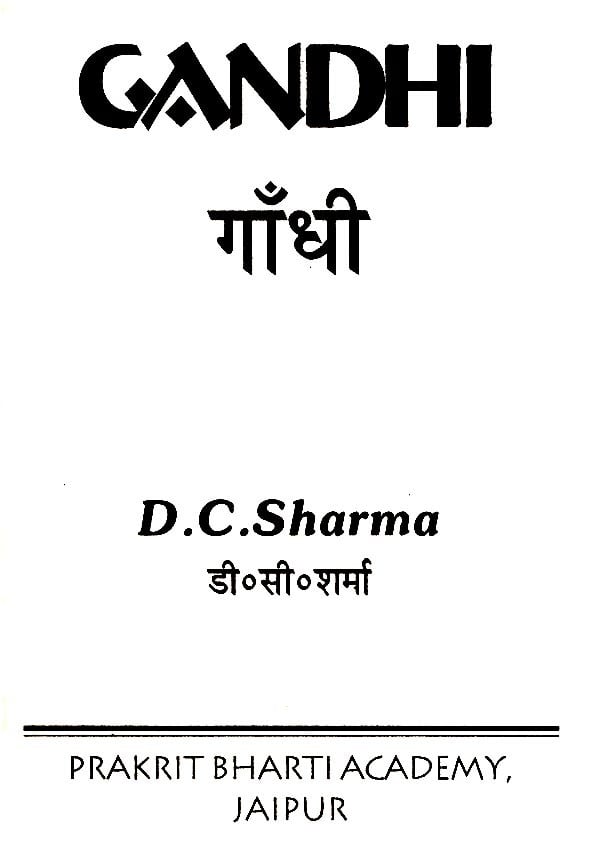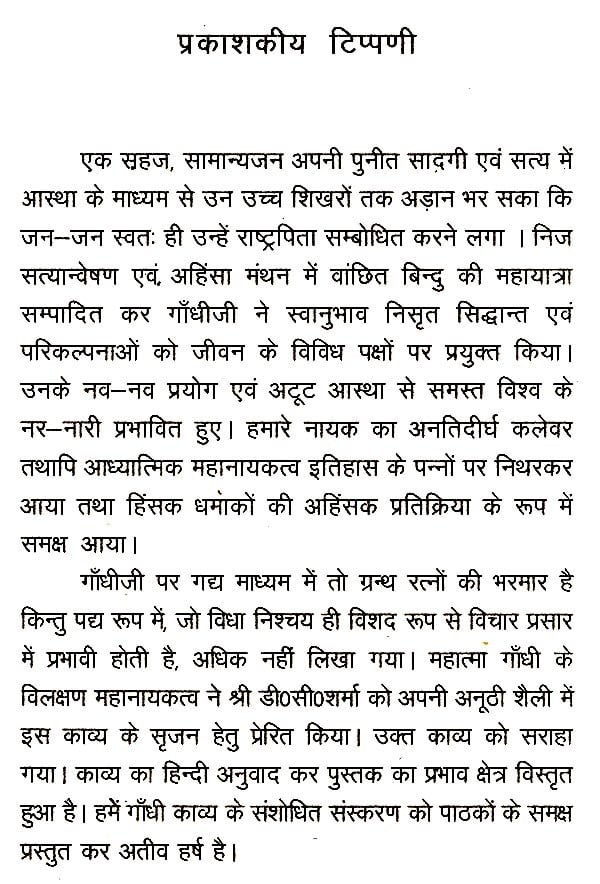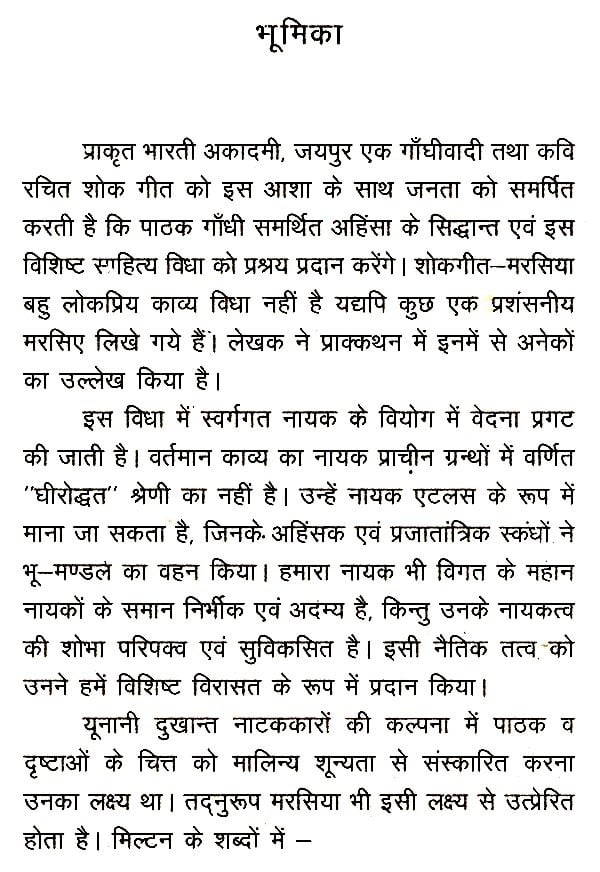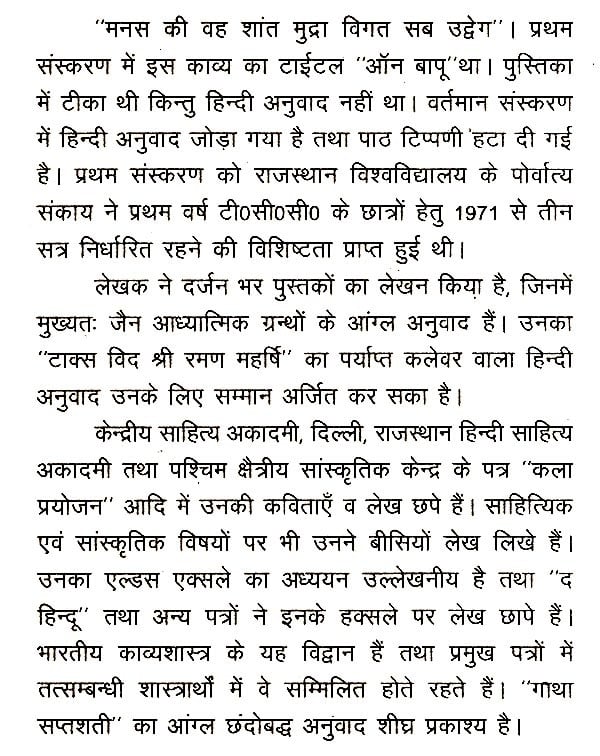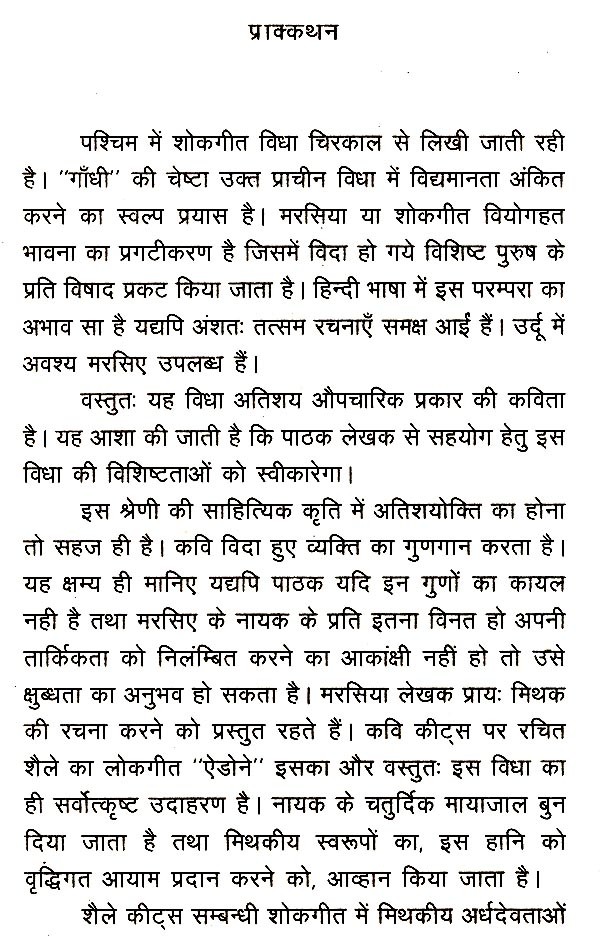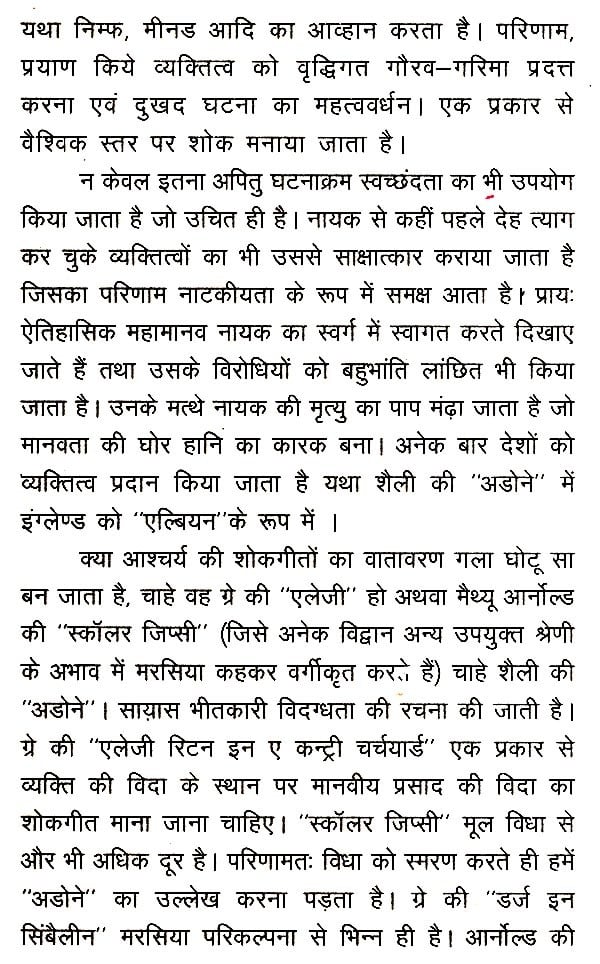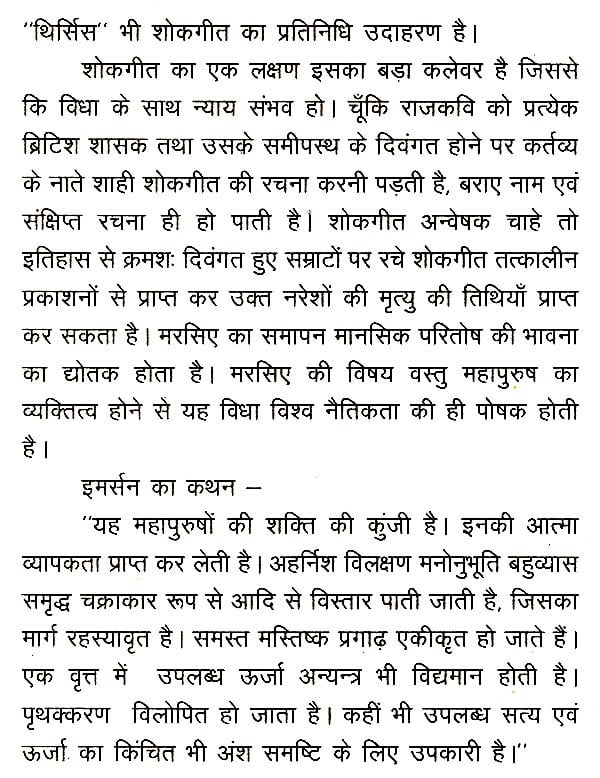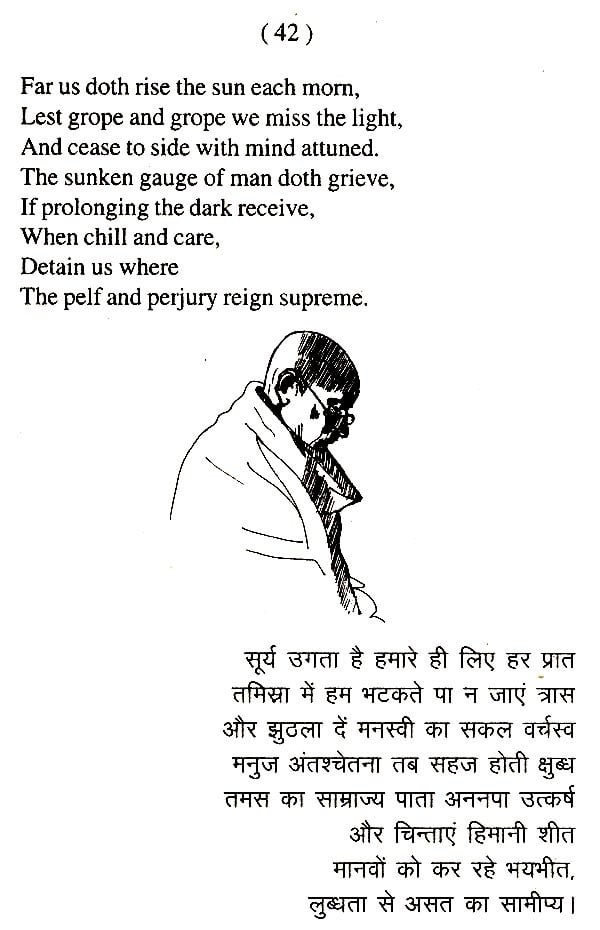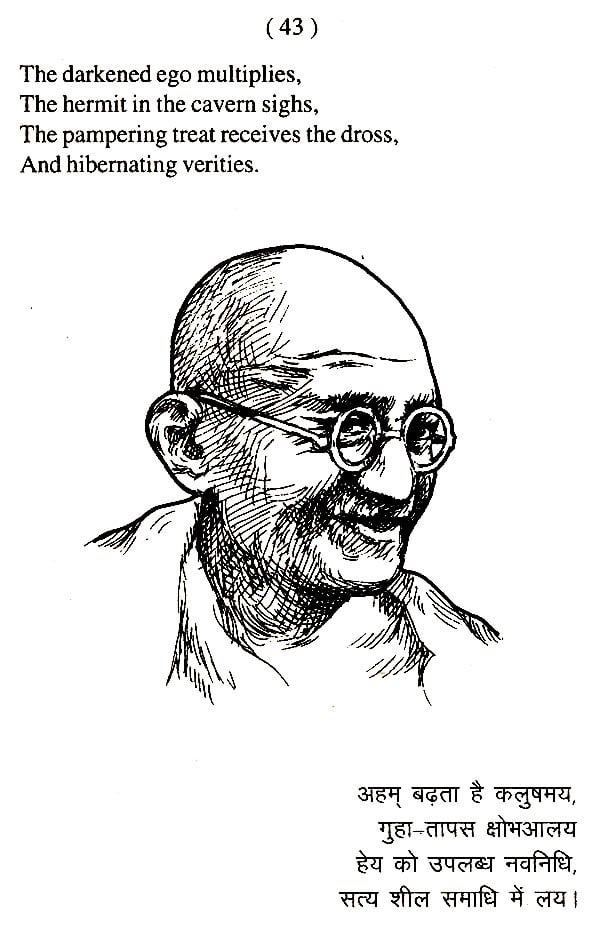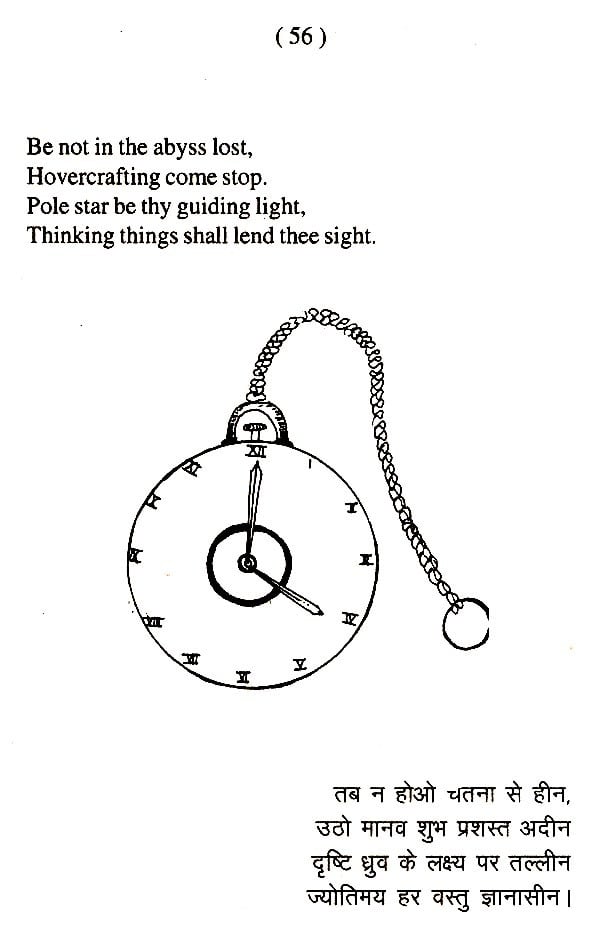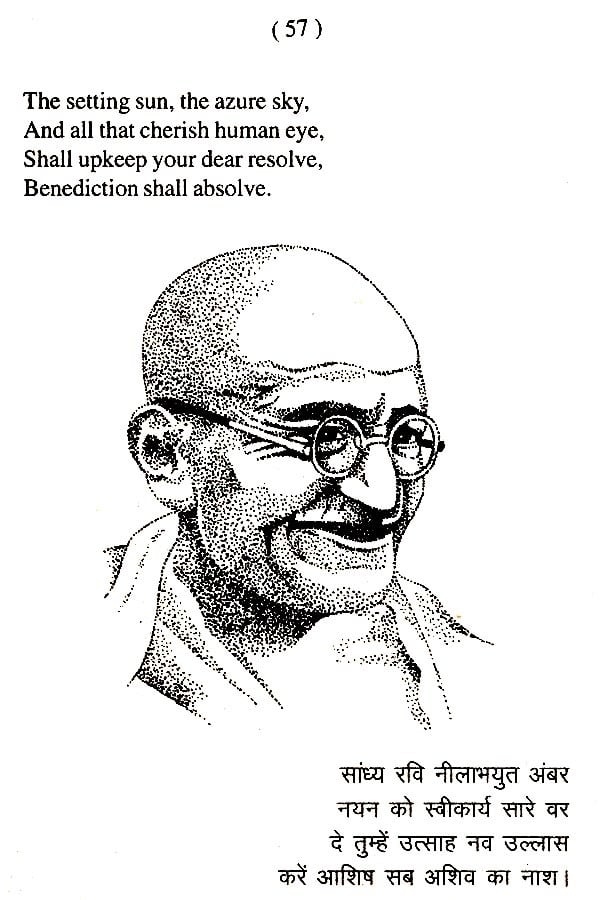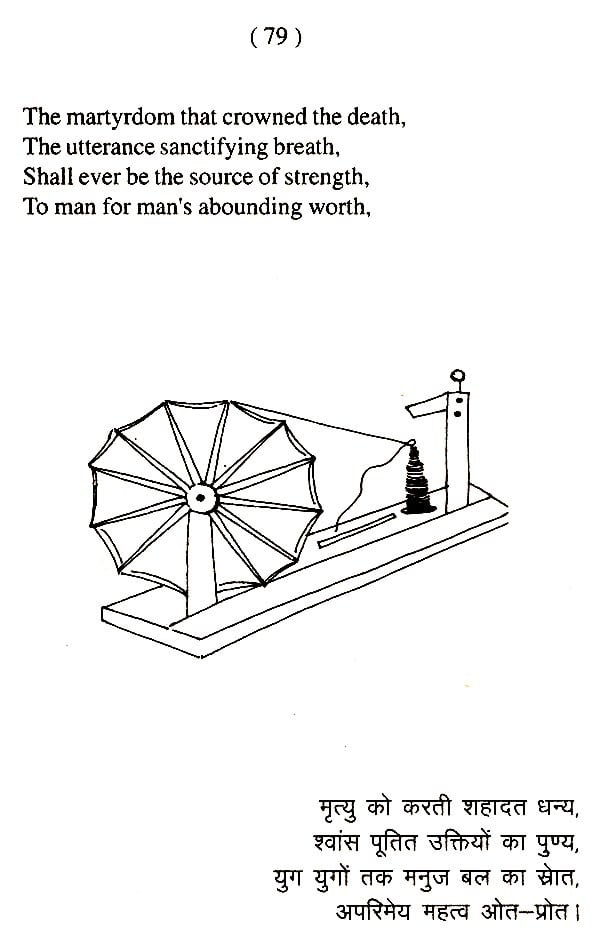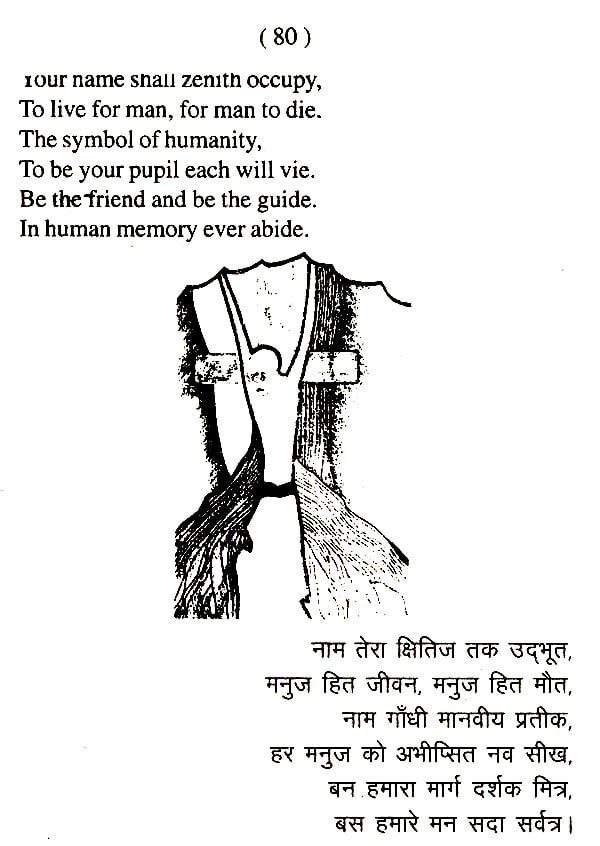
गाँधी- Gandhi
Book Specification
| Item Code: | UAC458 |
| Author: | D.C. Sharma |
| Publisher: | Prakrit Bharati Academy, Jaipur |
| Language: | English Text With Hindi Translation |
| Edition: | 2004 |
| Pages: | 80 (Throughout B/W Illustrations) |
| Cover: | PAPERBACK |
| Other Details | 7.00X5.50 inch Depth |
| Weight | 110 gm |
Book Description
Prakrit Bharti Academy has sponsored a Gandhian and a poet's elegiac venture, with the fervent hope that the noble principles of truth and non-violence promoted by Gandhi as also this genre of literature will find a favourable response from the reading public. Elegy may not have been a very popular brand of poetry, though a number of brilliant works come under that class. The author discusses some of these in his preface.
It is a solemn desideration and melancholy for a hero who has left us. Here the hero is not "Dhiroddhat" of Indian classics. He is like Atlas who bore the globe on his shoulders which, however, were non-violent and democratic He is as dauntless as any hero of the yore. How-ever, his tone of heroism is mellowed and matured. That is the germ of his virtue that he leaves as a heritage for us.
Elegy accords us the frame of mind de-scribed as catharsis, the reward that the Greek tragedians sought to infuse in the psyche of their readers or spectators. In Milton's words -
"In the calm of mind, all passions spent." The first edition of this poem was titled "On Bapu" with textual comments but without Hindi translation. The latter finds place in the present edition. The first edition had the distinction of stay, ing on the syllabus of the university of Rajasthan for three sessions for the first year T.D.C. students of the oriental faculty from the year 1971.
The author has a dozen books to his credit, mainly, translations of Jain sacred texts into English. His vernacular translation of the massive "Talks with Shri Ramana Maharshi" also won for him a distinction. His poems have been published by Sahitya Academy Delhi and Rajasthan Hindi Sahitya Academy and journals like "Kala Prayojan" (of the WZCC). Besides, he has published scores of articles on literary and cultural issues. He is a scholar devoted to Aldous Huxley, an article on whom was published by "The Hindu" and many more by other distinguished journals. He is a scholar on Indian poetics and has figured in the massive debates on it in famous journals. His English verses that render "Gatha Saptashati" may see the light of the day one of these days.
Elegy has a hoary origin as a species of poetry in the west. "Gandhi" endeavours to carve a modest niche in that time-honoured tradition. Elegy is a threnody or a song of lamentation when some noble being suffers death. The tradition evinces no equivalent in Hindi poetry as such, even though there be works resembling this genre remotely in that language. However, Urdu language does provide us with the kind termed as Marsia.
Essentially, it a highly formal variety of poetry and the reader is expected to cooperate with the author by taking certain things for granted.
Some degree of hyperbole is inevitable in this variety. Dramatised and exaggerated virtues of the departed being are celebrated by the poet, a harmless and excusable foible, which may, how-ever, peeve the one not so much indulgent for the want of willing suspension of critical faculty and intellectual sympathy with the hero of the dirge. Myth-making is often indulged by elegy writers, the most remarkable sample of it, and indeed of the species of elegy as such, being "Adonais" by Shelley, an elegy on the poet Keats.
A regular phantasmagoria is woven around the central figure and mythological entities are invoked to heighten the dimensions of the fatal event.
Thus nymphs, maenads and a cluster of demigods are invoked by Shelley in "Adonais" to desiderate Keats. Thereby, the personage is granted an added significance and the event an enhanced momentousness. A kind of condolence on the universal scale is the result.
Not only that, but a permissible liberty is enjoyed by the author in inserting a string of anachronisms. Thus persons dead much before the advent of the central figure are brought face to face with the hero and dramatic reactions emerge thereby. Generally, mighty figures of history are shown to welcome the hero in heaven and also beings inimical to him are castigated and indicted with having had a diabolical share in causing this irreparable loss to humanity. Sometimes countries are also personified as is done England (as Albion) by Shelley in "Adonais".
No wonder an air of morbidity is often associated with elegies, be it Gray's "Elegy" or Matthew, Arnold's "Scholar Gipsy" ( Which is, probably, classed as elegy by certain scholars for the want of an appropriate category) or Shelley's "Adonais." A deliberately enervating air of melancholy is sought to be evoked. However Gray's "Elegy Written in a Country Churchyard" is, as it were, an elegy for the demise of human happiness rather than of an individual. "Scholar Gipsy" is still farther removed from the true genre that constrains one to cite "Adonais" at the merest mention of elegy. Gray's "Dirge in Cymbeline" does not agree with the conceptual elegy. Arnold's "Thyrsis" is also representative as elegy.
Another feature of an elegy is that generally it is supposed to be a poem of some length to do justice to the task. However as every poet laureate is entrusted with the poetic mourning of an English monarch or his kin, a perfunctory and consequently, briefer treatment is inevitable. Thus an elegy seeker might scan the pages of history of England to date the deaths of successive monarchs and find an official elegy by the poet laureate in the contemporary publications. The conclusion is always on a note of consolation. In as much as an elegy dwells upon a mighty soul, it conduces to the furtherance of world morality. To quote Emerson:
"This is the key to the power of the great men. Their spirit diffuses itself. A new quality of mind travels by night and by day, in concentric circles from its origin and publishes ‘itself by unknown methods : the union of all minds appears intimate, what gets admission to one can-not be kept out of any other. The smallest acquisition of truth or energy, in any quarter, is so much good to the commonwealth of souls.
" Thus the existence of mighty beings incessantly adds to the universal cultural heritage. Every instant of their life is devoted to the en-richen of the earth. Mundane and selfish ends stir them not. Like trees they consume not their own fruits. That leads us to cherish them, to as-say as best as we can to be their like.
**Contents and Sample Pages**
